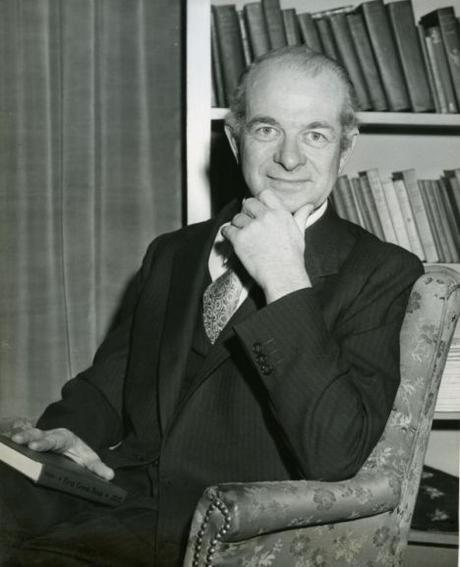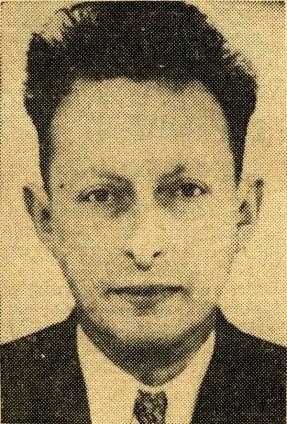 Linus Pauling, 1950
Linus Pauling, 1950[Pauling as Administrator]
Even before becoming Chairman of the Division of Chemistry and Chemical Engineering at the California Institute of Technology, Linus Pauling had been viewed by some of his colleagues, particularly his predecessor A.A. Noyes, as being inclined to delegate responsibilities. This tendency became more evident following the conclusion of World War II, as the push to promote biochemical research within the division moved forward. While Pauling continued to steer the division toward a future focused intently on biochemistry – advocating for and securing funds to support biochemical medical research – he also began to withdraw from other duties, shifting some of them to his colleagues.
A significant factor behind the need to delegate was Pauling’s increasing involvement in peace activism and, particularly, his schedule of public speaking related to the use and testing of nuclear weapons. These activities ultimately brought Pauling before Caltech’s Board of Trustees, who contemplated his dismissal.
In 1949 the board communicated to Caltech President Lee DuBridge that public statements being made by Pauling on issues of peace and nuclear weapons were “damaging” to Caltech’s reputation. In response, Pauling is said to have “pledged” to DuBridge that he would cut back on his political activism, since he did not want his political views to interfere with his scientific work. President Truman’s decision to develop a hydrogen bomb the next year changed Pauling’s mind however, and he was again brought to the attention of Caltech’s leadership. This time, Pauling told DuBridge that he wished to speak with the trustees directly.
Meanwhile, the board had formed a committee made up of five trustees and five faculty members who were asked to determine whether or not Pauling should be dismissed from Caltech. In a statement dated July 14, 1950, Pauling expressed shock at having learned of this unexpected action by the trustees. In particular, Pauling’s tenure rank and hugely successful twenty-eight year career at Caltech had not prepared him for such an extreme possibility.
Three days later, on July 17, Pauling was given the chance to speak to the board and repeated to the trustees what he had earlier told DuBridge: he wanted to cut back on his political activities. But this ambition was couched, with Pauling noting that
I still propose to do this, at a rate determined by the world situation; however, I remain unwilling to pledge myself to cease all political activities.
Regardless, Pauling made it clear that he did not want to harm Caltech and would do “anything compatible with my conscience and my principles” to protect its reputation.
 Sidney Weinbaum
Sidney WeinbaumIn actual fact, Pauling did not believe that he was harming Caltech’s reputation at all. Rather, after surveying several colleagues and students who told him that his activities had caused no “appreciable damage” to them, Pauling concluded that he was actually helping the institution’s standing.
President DuBridge harbored a decidedly different point of view, informing the board that “many staff members” had told him that Pauling’s actions had “damaged them greatly.” These sentiments focused in particular on Pauling’s support for Sidney Weinbaum, a Russian émigré who became a United States citizen in 1927 and completed his Ph.D. at Caltech in 1933.
Weinbaum, who was Pauling’s research assistant in 1929, had been charged with being a communist, and his case eventually drew the FBI to Caltech. This led to Weinbaum’s removal, as a possible security risk, from his position at the Jet Propulsion Laboratory in 1949. During his appeal, which was supported by Caltech, Weinbaum denied being a communist. The government subsequently dropped their previous allegations against Weinbaum in favor of new charges of perjury, for which he was arrested.
Pauling and Weinbaum were friends, so much so that the Paulings offered a room in their home to Weinbaum’s spouse following his arrest. Pauling also offered $2,000 for Weinbaum’s legal defense, and helped to raise more from other sources.
But DuBridge did not like the potential optics of the situation and suggested in particular that Pauling raise money by word of mouth, and not through the mail. An undated form letter authored by Pauling and five others, and appealing for money to support Weinbaum’s case, suggests that Pauling either ignored DuBridge’s advice or that DuBridge was trying to reel Pauling back in. Ultimately, Pauling’s efforts did not take, and Weinbaum was sentenced to four years in prison.
As the year moved forward, Pauling’s public persona continued to emerge as a source of concern for DuBridge and Caltech’s board. In October 1950, Pauling came under further scrutiny after being named by Senator Joseph McCarthy as a communist. McCarthy fanned the flames of this allegation by also defining Pauling as an atomic scientist who had received classified information from the Atomic Energy Commission as a result of his connections with the Guggenheim Foundation. The Senator was quick to add that the foundation was rumored to have “a flagrant record of giving fellowships to Communists.”
Responding internally, Pauling explained to Charles Newton, DuBridge’s assistant, that he was only on the Committee of Selection for the Guggenheim Foundation and could in no way be involved with the organization in the ways that McCarthy had suggested. Pauling added that McCarthy was likely targeting him for his peace work.
With interest in his politics hanging over his status at Caltech like a sword of Damocles, Pauling remained in the dark about any conclusions reached by the Board of Trustees’ select review committee, before which he had never been called to testify. Another twelve years would pass before DuBridge finally informed Pauling that the committee had recommended, in May 1952, that nothing be done to punish Pauling. Instead, the committee suggested that Pauling be continually pressed to end his political activities in order to forestall criticism of the Institute. And indeed, as time went on, the internal pressure on Pauling was increased.
Though Pauling’s political activism began to intrude more frequently on his daily responsibilities, he continued to take pride in heading Caltech’s chemistry division, which was racking up the successes. In 1950, Pauling reported to division staff that the Committee on Professional Training had given the chemistry program an overall grade of A, as well as A grades in physical chemistry, inorganic chemistry, and analytic chemistry, with a lone B issued for organic chemistry. Pauling delighted in boasting of these types of accomplishments, and also continued to actively work with incoming students.
One such student, Fernando L. Carraro of Brazil, first wrote to Pauling in 1950, expressing an interest in Pauling’s research on antibodies. Over subsequent exchanges, it became clear that Carraro wanted to study with him at Caltech. In response, Pauling suggested that Carraro apply to the Institute in 1953, and that he also seek funding from the Guggenheim Fellowship for Latin American students. In the meantime, Carraro wanted to know what he should study, to which Pauling offered the idea of mathematics.
In providing guidance related to the Guggenheim fellowship, Pauling further suggested that Carraro could focus on the structure of proteins, the application of quantum mechanics to molecular structure, or the analysis of gas molecules by electron diffraction during his stint in Pasadena. Pauling also warned Carraro that he would likely not be given a graduate assistantship since he had not attended an American university.
Carraro’s fellowship was ultimately approved and he studied under Pauling from 1954 to 1955. Though a small story in the grand scheme of Pauling’s life, his interactions with this student from Brazil serve as evidence that, despite everything else that was vying for his attention, he continued to set aside time for those wishing to learn.
